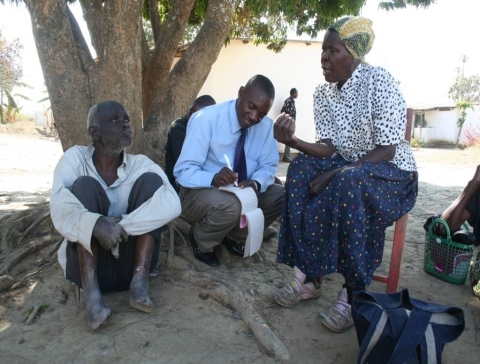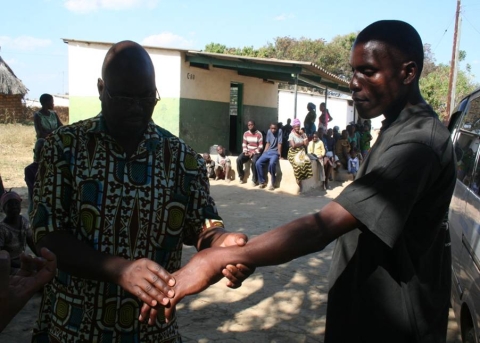
Sylvestor talking to chairperson of the community Evelina Njovu who looks after two grandchilren with leprosy

A leprosy patient whose hand is falling off
What do you do when you bring out your hand to greet someone and you get a stump (where fingers should have been) extended to you? In a split second decision I decided the best thing was to give the person a hug instead.
No big deal, but I held myself stiff for some time. I was uncomfortable. I had hugged a person with leprosy! It reminded me of the early days of AIDS where no one wanted to shake hands with infected people. Even though the debriefing said leprosy was not as easily contagious as people believed, I was relieved to take a hot shower during lunch.
I hadn’t thought about it much as we travelled to a former leprosarium. It was just another health story, one that had not been covered in decades. I travelled with a reporter and photographer whom I hadn’t worked with before. They were very nervous about the story for two reasons, apart from the fact that it is always sensitive to talk about peoples’ disabilities. First, it appeared that because there were so few lepers, the government had stopped prioritizing them. There was also the argument that because there were fewer cases of leprosy, those who contracted it were simply falling through the cracks.
The Times is a government newspaper, and there are presidential elections around the corner. To criticize now would be inviting trouble. And yet, how could they put a positive spin on such a story? American journalists would never face such a quandary, but such is the reality in Zambia.
Like me, the only information they had on leprosy was basically what was contained in the Bible. We googled for more information but were still totally unprepared for the reality.
I had to keep my face passive as a young man told me he woke up one morning and found that a digit on his fingers had just fallen off. Or when I saw a little child who was playing with red-hot ash. As he had no sensation in his hands, he didn’t feel the heat and it was burning what was left of the stumps of his hands.
The medical superintendent, Patrick Muchaya, told us that leprosy was no longer a significant health issue in Zambia. In the early 70s, there were about 36,000 people with leprosy in Zambia. The country had successfully embarked on the World Health Organization’s leprosy-control target of less than one in every 10,000 people between 1998 and 2000.
He also said since 1993, Liteta Hospital stopped admitting new patients. Instead, the Ministry of Health had trained focal point persons in every district that were responsible for addressing issues concerning leprosy.
The leprosarium is no longer called that; It’s now just Liteta hospital, 500km out of Lusaka. The leper colony, where people with leprosy were sent to live, is now called an out patient community village for those on treatment who are being monitored before being sent back to their villages.
The hospital encourages people to seek treatment in their localities and sends patients home for continued treatment. The hospital wants to concentrate on offering general health services to the surrounding community. Leprosy is tied with Tuberculosis, the treatment is almost the same, so just as clinics and health institutions are able to treat TB, leprosy is also treatable without having to send people to Liteta.
But there are leprosy patients who are still in the village. Many of them came to the village in the early 70’s and are unable to go back home because of the shame of leprosy. Even after they have been cured, patients still suffer harsh stigma and discrimination.
Their lives are dismal. Patients whose disease has progressed wait for their limbs to fall off, fingers to form into claws, to go blind and to suffer all kinds of debilitations. That’s not all: because they loose sensation in their limbs they often hurt themselves, causing ulcers which get infected and the withering just goes on.
There are about 40 former leper patients, some with their families, still living in the community. Others have been re-integrated into their villages. The former leprosy patients who have been there for a long time, unlike the other outpatients, do not have relatives to bring food for them, so they rely on the hospital, which in turn relies on well wishers, the church, and NGOs, for sustenance.
The medical officer said the symptoms of leprosy were easy to diagnose, and the treatment, while long term (six months to a year), was easily and freely available in all health centres. People delayed getting medical attention for various reasons: ignorance, traditional beliefs of witchcraft and poor access to health care. Muchaya says leprosy will always be there, but health officials need to know how to better manage it, and the advocacy and sensitization campaigns must continue.
We discussed how to work our way around the political challenges of such a story, and settled for writing a positive piece on how Zambia has managed to keep its incidences of leprosy down to one in every 10,000. But there would also be some stand-alone interviews as the patients had said their piece about how they were being forgotten by society.
The Ministry of Health said they wanted to look at all the pictures and the stories before publication! Apparently, this was one of the conditions for permission to visit the hospital. I have left that particular battle to the editors.